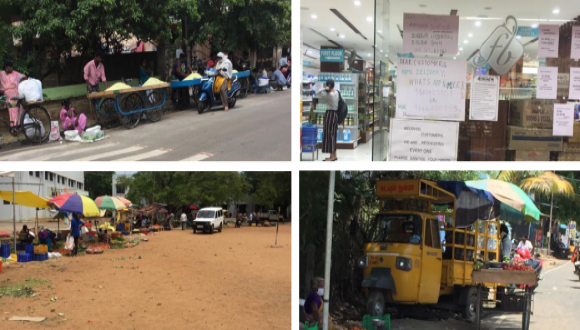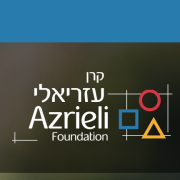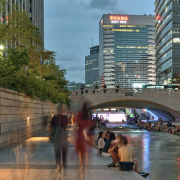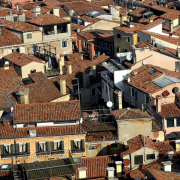Cities & Covid-19 | Chennai, India by Mahesh Balasubramani
Students & researchers share their impressions of urban living during a pandemic | a TAU City Center special project
Deploying technology and idle resources in innovative ways: Key ingredients to urban resilience
I was born and raised in Chennai and I have spent 28 years of my life here.
Chennai is the capital city of Tamil Nadu, a provincial state which geographically forms the South-Eastern tip of India. The COVID-19 pandemic, as in the case with any other city, transcended into an unprecedented crisis in urban life and machinery of Chennai.
Attracting about 45% of the country’s foreign health tourists to its private-owned hospitals, Chennai is held to be the ‘Health Capital of India’. The city topped the list for highest number of COVID-19 diagnostic tests conducted and highest recovery percentage in the country.
Unavoidably, most of the private-owned hospitals in Chennai shut their gates to ailments except for emergencies. However, this closure casted the attention on ancient, traditional healing practices like Ayurveda and Siddha as patients of non-COVID ailments flocked these clinics for unconditional treatment. Some consultants, particularly the dermatologists, used WhatsApp video calls for patient consultation. A reputed private hospital deployed a mobile application for providing consultations and authorised prescriptions.
Figure 1: Top left and right: Private owned hospitals displaying placards that they offer only
emergency medical services;
Bottom left and right: Traditional Siddha and Ayurveda hospitals are
open and offer unconditional treatment to ailments
The Koyambedu Market Complex in the city, one of the largest perishable goods market in Asia, was closed to curtail the spread of the virus.
In response, new markets were set up in school and college playgrounds as educational institutions remained closed. Smaller trucks, which were idle without transport consignments, were employed by municipal corporations and entrepreneurial individuals to take supplies directly from the larger trucks and sell/distribute the perishables at major junctions in a locality.
Mobile carts, which were previously put in use as petty shops outside religious and historic attractions, were mobilised to take supplies from the smaller trucks for street-level sale of perishables.
Virus-idled labourers set up stationary vegetable/fruit shops opposite residential apartments. Supermarkets accepted orders through WhatsApp and sent alerts for pickup. Many vendors made fresh provisions to accept digital/mobile wallet payments.
Figure 2: Clockwise from top: Picture 1 - A vendor selling flowers on a mobile cart;
Picture 2 - A small truck replenishing the supplies of a stationary vendor and a mobile cart; Picture 3 - A supermarket offering to accept pickup/delivery orders through whatsapp; Picture 4 - A school playground-turnedmarket that is continuously monitored by police (white vehicle) for social distancing; Picture 5 - A small truck that was hired by the municipal corporation for street-level sale of vegetables
While Chennai ranks poorly in the recreational space per capita, the closure of these scarce recreation spaces ever since the lockdown added to the city’s woes.
The residents found alternative, interesting avenues like flying kites or playing Ludo boards for recreation. Ludo also became the highest downloaded mobile game in this period of lockdown (250 million downloads during this COVID-19 lockdown).
Figure 3: Left - Kite flying in my neighbourhood; Right - My family members playing a game of Ludo
However, there were other instances wherein path dependencies were reconfigured in undesirable ways.
Chennai ranks second in the country for the share of daily trips made through public transport. In spite of government and private organisations being allowed to operate recently, public transport modalities were still not restored.
Though Chennai is known for its efficiency in solid waste management, solid waste collection services ceased to operate in peripheral localities amidst COVID-19.
More than 200,000 migrant labourers who lost their livelihoods were sent from Chennai to their native states at the cost of the government.
Now that construction industry in the city is swinging back to normal, the city will encounter significant challenges in mobilising these labourers back. In the process of recovering from COVID-19, the city has important lessons to learn on inculcating resilience. Questions remain on how technology and idle resources can be deployed in novel ways.
Figure 4: Top left - Empty bus terminus (It is about three months since I saw a bus); Top right - Garbage bins unmanaged for days together; Bottom: School-going children being the primary users of bicycles, a bicycle-repair shop remains closed amidst lockdown
_________________________________________________
Mahesh Balasubramani is an about-to-graduate PhD Scholar with the Department of Civil Engineering, Indian Institute of Technology Madras, Chennai, India.
He pursued his Masters Degree on Construction Technology & Management as well at Indian Institute of Technology Madras.
His doctoral research looks at how governance arrangements in infrastructure megaprojects take shape and evolve. Having submitted his initial doctoral thesis, Mahesh awaits the final defense/viva-voce. He has particular interests in the research on sociomateriality of disruptive and sustainable transitions that are required today in urban and rural infrastructure settings.
He looks forward to shaping his academic-research career in development planning.
*Text and images by Mahesh Balasubramani





